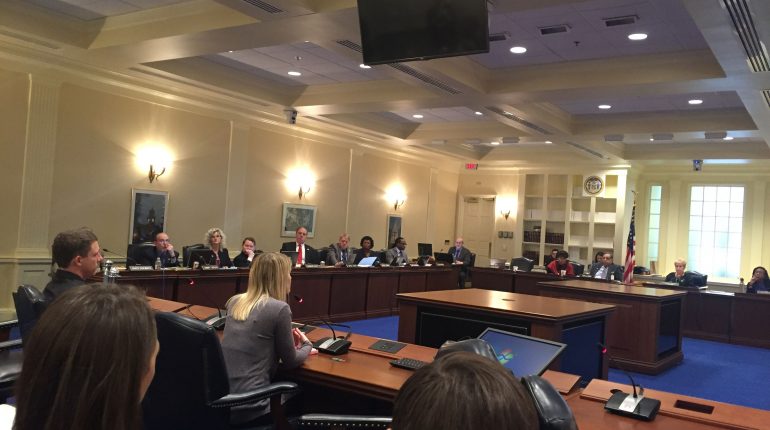ANNAPOLIS – When Erin Merryn was sexually abused by a neighbor at the age of 6, she said, she felt she had no one to tell.
She said she did not tell her parents or report it to her kindergarten teacher. Growing up attending Illinois public schools, she had learned how to say no to drugs and what to do in the case of a tornado or a fire, but she had not learned how to deal with this.
“The only message I ever got as a child was from my abusers: This is our little secret, no one will believe you, if you tell anybody I’ll come get you,” Merryn said.
“(No one) was educating me on personal body safety, on the differences between safe touch, unsafe touch, safe secrets, unsafe secrets.”
Now Merryn, 31, works to enact legislation known as “Erin’s Law” that provides for personal body safety education in public schools, traveling to state capitals across the country to testify about her experience.

Thursday, Merryn appeared in front of the state’s House Ways and Means Committee to support H.B. 72, which would require Maryland schools to implement an “age-appropriate” sexual assault and abuse awareness and prevention program for grades K-12.
H.B. 72 was introduced by Delegate Eric Luedtke, D-Montgomery. Under this law, the State Board of Education would create standards for the program, and schools would incorporate the program into their health curricula, Luedtke said. The bill also requires the program be taught by a teacher who is trained to provide this type of instruction.
Twenty-six other states have already passed versions of Erin’s Law, Luedtke said, and he hopes Maryland will be next.
“Really the message is, if you feel uncomfortable with the way an adult is touching you, you report it immediately, and that’s the message kids need to have,” Luedtke said. “And it’s the single most effective thing we can do to stop abuse.”
While many schools address dating violence and abusive relationships in their curricula, most do not currently discuss childhood sexual abuse, Luedtke said.
Luedtke and Delegate Edith Patterson, D-Charles, sponsored a similar bill last year. Luedtke said he decided to pursue this legislation after a contractor inappropriately touched a student in the hallway of Baker Middle School in Damascus two years ago.
“That was only the most recent of a number of incidents we’ve heard about in different parts of the state,” Luedtke said.
The 2015 bill passed the House 138-2 but received an unfavorable report from the Senate Education, Health and Environmental Affairs committee. Luedtke said he is hopeful this year’s bill will fare better because work has started earlier in the session and people are more familiar with the issue.
One objection Merryn often hears from legislators is that her bill is an “unfunded mandate,” she said. Merryn said federal law provides for funding to purchase materials and hire educators for prevention programs.
Maryland residents and members of the Maryland Coalition Against Sexual Assault, the Baltimore Child Abuse Center and the Catholic Archdiocese of Baltimore also testified in favor of the bill. No one testified in opposition of the bill Thursday.
Adam Rosenberg, executive director of the Baltimore Child Abuse Center, said his center sees more than 1,000 children each year who have been the victims of abuse and neglect. Victims of childhood abuse are at higher risk for teen pregnancy and more likely to drop out of schools or become victims of human trafficking, he added.

By educating children at an early age, adults can help kids protect themselves, Rosenberg said.
“We know that one of the best tools to prepare these kids is that personal body safety curriculum,” he said.
Lisae Jordan of the Maryland Coalition Against Sexual Assault said H.B. 72 would not only help victims of childhood abuse, but could also combat the issue of sexual assaults in college. One in five college women is sexually assaulted during their time in school, she said.
While child sexual abuse is a difficult topic for many people to talk about, Luedtke said, it is an important conversation that adults must be having with their children.
“As a parent and as a teacher myself, I think our highest moral calling as parents is to take care of our kids and make sure they’re safe, and our laws aren’t strong enough right now,” Luedtke said. “We need to do more.”


You must be logged in to post a comment.